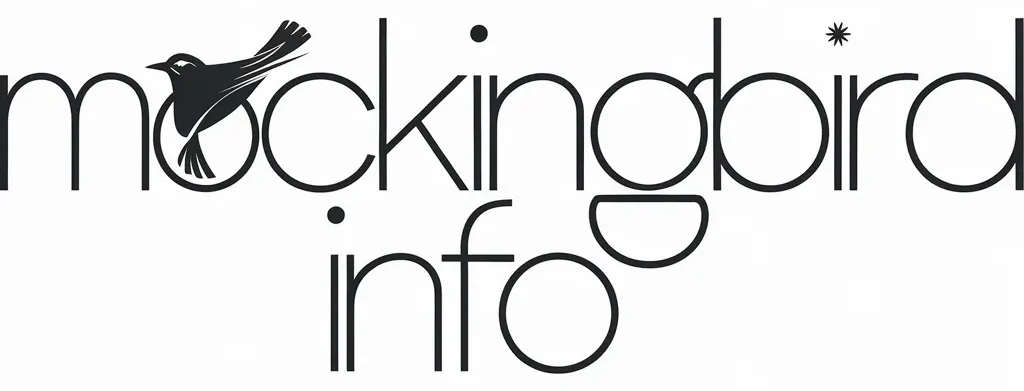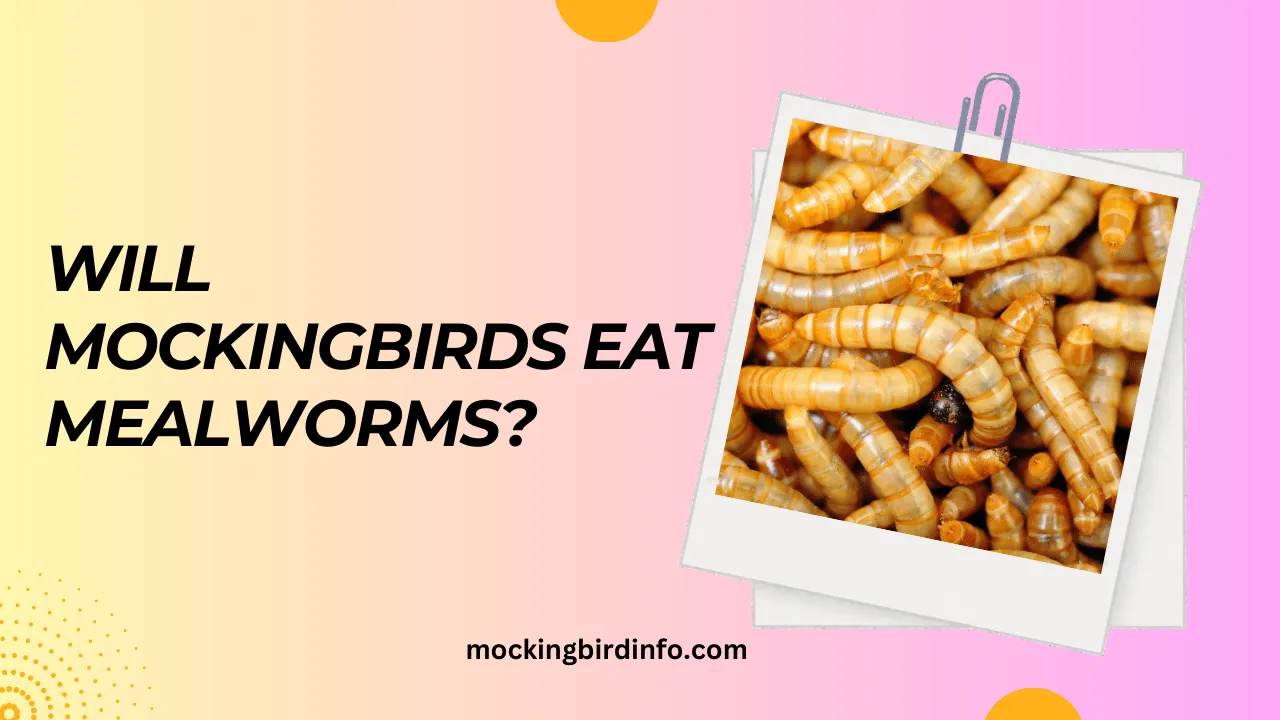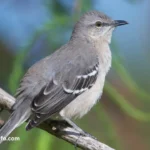Mockingbirds, with their unique ability to mimic the sounds of other birds and animals, are a delight for birdwatchers and nature lovers.
Known for their wide-ranging songs, they are often spotted in yards, parks, and even urban areas, where their colorful personalities and vocal abilities captivate many.
But beyond their vocal talents lies a fascinating aspect of their behavior—their feeding habits. What do they eat, and how do they adapt to different environments to find food? One such question that often comes up is: Will mockingbirds eat mealworms?
Mockingbirds are opportunistic feeders, meaning their diet includes a wide range of both plant and animal-based foods. Mealworms, a common food offered in bird feeders, are a significant source of nutrition for many birds, but do mockingbirds find them appealing? The answer is a definitive yes.
Mockingbirds do eat mealworms, particularly when other food sources are in short supply. This article will explore why mealworms are a valuable addition to their diet, the factors influencing their consumption, and the benefits and risks of offering mealworms to mockingbirds.
Understanding what attracts mockingbirds to mealworms and how to offer them responsibly can be a rewarding experience for those wishing to engage with these fascinating birds. Let’s dive into the intricacies of the mockingbird’s diet and how mealworms fit into their feeding habits.
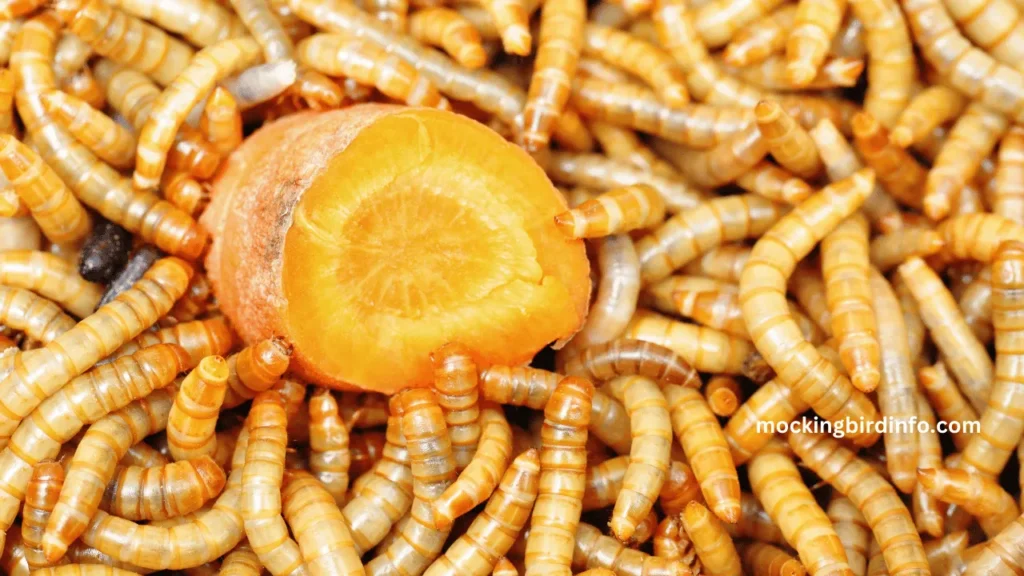
Contents [hide]
The Mockingbird’s Diet
Omnivorous Nature
Mockingbirds are omnivores, meaning they consume both plant and animal matter. This dietary flexibility is one of the reasons they can thrive in diverse habitats.
Whether in urban settings, suburban gardens, or wild landscapes, mockingbirds are able to find and eat a variety of foods. Their omnivorous nature means they will take advantage of whatever food is available at a given time.
The mockingbird’s omnivorous diet consists of a balance of fruits, seeds, nectar, and insects. During warmer months, they will primarily feast on insects and spiders, which are a high-protein source, essential for their growth and energy.
In the fall and winter, they turn to fruits, berries, and seeds, which provide essential carbohydrates and vitamins to sustain them through colder months.
Diverse Diet
Mockingbirds are known for their wide-ranging diet. They will eat insects like grasshoppers, beetles, caterpillars, and ants, as well as small fruits, such as berries, grapes, and even the occasional nectar from flowers.
Their ability to adjust their diet according to the changing seasons and available resources allows them to survive in various climates and environments. During times of insect scarcity, they may also turn to seeds or even grains.
In addition to insects and fruits, mockingbirds may consume nectar from flowers and occasional small reptiles or eggs. This extensive diet helps to support their high energy needs, especially during breeding season when their activity levels increase.
Opportunistic Feeders
As opportunistic feeders, mockingbirds are quick to take advantage of whatever food sources are readily available. This ability is especially important in areas where food resources fluctuate, such as in urban settings or during the winter months.
If mealworms are accessible, mockingbirds will readily consume them, particularly if they are hungry or seeking protein-rich food during breeding or molting seasons.
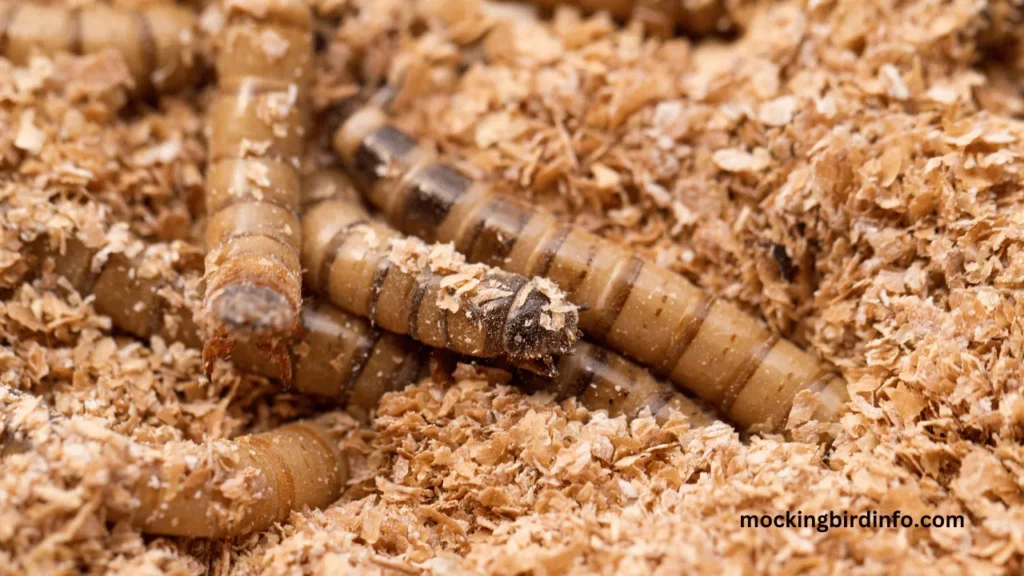
Nutritional Value of Mealworms
Protein Source
Mealworms are a great source of protein, which is essential for birds’ growth, feather development, and reproductive success. Protein is crucial for the formation of new feathers, the development of chicks, and energy-intensive behaviors like flight and territorial defense.
During the breeding season, when mockingbirds require extra energy, mealworms can be an excellent food supplement to meet their protein needs.
Mealworms provide high-quality protein, making them ideal for feeding birds during times of high energy demand. For mockingbirds, mealworms offer an efficient and nutrient-dense food source that helps sustain their vitality throughout the year.
Essential Nutrients
In addition to protein, mealworms are rich in fats, minerals, and fiber, all of which are essential for maintaining overall health. The fats in mealworms provide energy, while minerals like iron and potassium contribute to healthy metabolism and muscle function.
Fiber in mealworms aids in digestion and ensures proper absorption of nutrients. The high-fat content of mealworms is especially beneficial during winter months when mockingbirds need extra calories to maintain body heat.
These nutrients support not only energy production but also immune system function, helping birds stay healthy throughout the colder months.
Attractiveness to Birds
Mealworms are also attractive to birds because of their movement. The wriggling motion of live mealworms imitates that of natural prey, stimulating birds’ hunting instincts.
This makes mealworms particularly enticing to mockingbirds, who are active foragers and will eagerly hunt for live insects in the wild.
Factors Influencing Mealworm Consumption
Availability of Other Food Sources
Mockingbirds, like many birds, are influenced by the availability of natural food sources. When insects and fruits are abundant, mockingbirds may not be as inclined to seek out mealworms.
However, during times of food scarcity—such as in the winter, during a drought, or in areas with few natural food sources—mockingbirds will turn to alternative food options, like mealworms, to supplement their diet.
If other food sources are in low supply, mealworms become an attractive alternative that can provide the protein and nutrients mockingbirds need to stay healthy.
Bird’s Nutritional Needs
Mockingbirds’ nutritional needs fluctuate throughout the year. For example, during breeding season, mockingbirds require more protein for egg production and chick development. This makes mealworms especially valuable during this time.
Similarly, during molting, when birds shed old feathers to grow new ones, mealworms provide the necessary protein and fats that support the growth of strong, healthy feathers.
Mockingbirds’ dietary preferences can also change depending on their age and health status. Younger or weaker birds may be more inclined to eat mealworms if they are easier to catch than live insects.
Individual Variation
Just like humans, individual mockingbirds may have different preferences. Some might be more inclined to eat insects or fruits, while others may prefer mealworms.
There is no guarantee that every mockingbird will be attracted to mealworms, but many will accept them, especially if they are hungry and other food sources are scarce.
Benefits and Drawbacks of Offering Mealworms
Nutritional Benefits
The main advantage of offering mealworms to mockingbirds is the boost in nutrition. As a protein-rich food, mealworms can help mockingbirds maintain strong health and energy levels, particularly during times of high demand like breeding and winter.
Offering mealworms in moderation can also help support healthier, stronger birds, promoting breeding success and overall well-being.
Mealworms can contribute to a well-rounded diet, enhancing mockingbirds’ ability to thrive in urban environments or areas with less access to natural food sources.
Attracting Undesirable Wildlife
While mealworms are beneficial to birds, offering them can attract other animals like rodents, raccoons, and even ants. These creatures may be less desirable in your yard, as they can cause problems for the ecosystem or damage feeders.
To prevent attracting unwanted wildlife, it is important to place mealworm feeders in secure locations that are difficult for other animals to reach.
Potential for Overreliance
If mockingbirds become overly dependent on mealworms as a food source, they might lose some of their natural foraging instincts. This could make it more difficult for them to survive in the wild when mealworms are not available.
Offering variety in food sources is key to ensuring that mockingbirds maintain a balanced diet and continue to hunt for natural prey when possible.
Tips for Offering Mealworms
Placement of Feeders
Secure feeders are essential for preventing access by unwanted animals. Consider placing mealworm feeders in areas that are elevated, such as on a pole or in hanging baskets, to keep them away from rodents and predators.
Frequency of Feeding
Offer mealworms in moderation. Too much food can encourage dependence, while too little may not provide enough nourishment. Typically, feeding once or twice a day is sufficient, but adjust based on the number of birds and the availability of natural food.
Feeder Maintenance
Ensure feeders are clean and dry to avoid mold and bacteria growth. Clean the feeder regularly, especially after rainy days, to ensure the mealworms stay fresh and safe for consumption.
Conclusion
Mealworms can be a great supplement to the diet of mockingbirds, offering important nutrients like protein and fats that support their health, especially during the breeding season or winter.
However, as with any form of supplemental feeding, it’s important to use mealworms responsibly. Balancing natural food sources with supplements is key to maintaining a healthy and sustainable environment for mockingbirds.
By offering mealworms thoughtfully and observing the mockingbirds’ feeding habits, you can enhance your experience as a birdwatcher and contribute positively to the well-being of these fascinating creatures.
FAQs
1. Do mockingbirds eat live or dried mealworms?
Mockingbirds typically prefer live mealworms because of their movement, but they may also eat dried mealworms if necessary.
2. How often should I feed mockingbirds mealworms?
It’s best to feed them in moderation, offering mealworms once or twice a day.
3. Are mealworms safe for mockingbirds?
Yes, mealworms are safe as long as they are fresh and free from mold.
4. Can I attract mockingbirds with just mealworms?
While mealworms are a great treat, mockingbirds are also attracted to fruits, seeds, and insects, so a varied diet is the best approach.
5. Do mealworms attract other animals?
Yes, mealworms may attract rodents and other wildlife, so it’s important to place feeders carefully.
6. Are mealworms necessary for mockingbirds?
No, mealworms are not necessary, but they are a helpful supplement during times of food scarcity.
